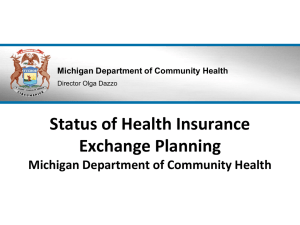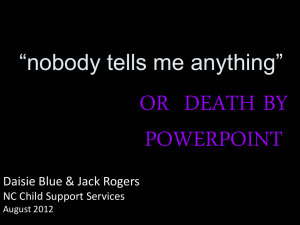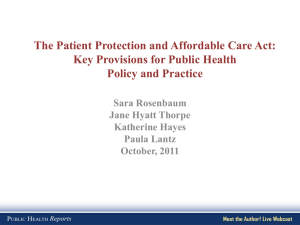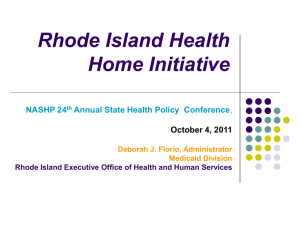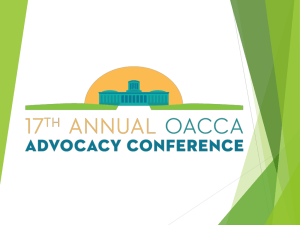Medicaid Update 2013 Dr. Wernert
advertisement
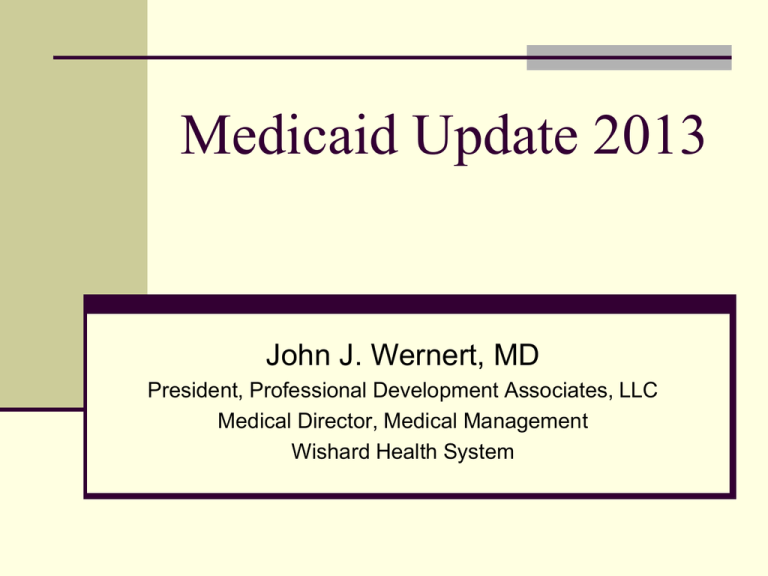
Medicaid Update 2013 John J. Wernert, MD President, Professional Development Associates, LLC Medical Director, Medical Management Wishard Health System Market Forces in U.S. Healthcare 2012 Broken FFS model = “sick-care” system ACA has completely changed the landscape ACO’s shift financial risk back to providers Price and Quality Transparency Technology – collect and share critical data Leading Health Plans transforming from “insurance carriers” to “health and wellness organizations.” Medicaid has become the platform for expansion of Government Health Insurance Indiana Medicaid Enrollees 2006 - 2010 Medicaid Expenditures in Indiana; 2006 - 2010 2011 Indiana Expenditures Medicaid Spending per group: Indiana Medicaid 2012 $6 B program – Indiana pays $1.5B 1.1 million Hoosiers on the program 695,962 in Hoosier Healthwise (3 MCE’s) 33,890 in Care Select 41,645 in Healthy Indiana Plan 268,296 in Fee for Service History of Indiana Medicaid Indiana Health Coverage Programs (IHCP) Hoosier Healthwise (began 1994) Care Select (began 2007) Other (Traditional, 590, etc.) RBMC (State contracts with MCOs) PCCM (State Contracts with CMOs) Fee-for-Service (FFS) Maximus, MDwise, Wellpoint, and MHS Maximus, MDwise, ADVANTAGE Health Solutions, and EDS EDS - Claims ADVANTAGE Health Solutions - PA Three NATIONAL trends in Medicaid suggest that urgent attention is warranted: 1) Total Medicaid spending on the rise, crushing state budgets 2) Growing Enrollment and Expansion coming Provider reimbursement cuts Benefit restrictions Potentially add 60 million enrollees nationally Indiana projections – additional 360,000 to 1.2 m current 3) Quality and Access to Care for Recipients falling further behind commercial The State of Healthcare NCQA 2007 - 2010 Study - reported that Medicaid lags the commercial sector in every care effectiveness and patient satisfaction measure - in some cases, the quality of care provided to Medicaid enrollees is as much as 30 percent below that provided to commercial enrollees. In Medicaid, the 20/80 has become the 5/50 In Medicaid, the elderly (NH) and adults with disabilities make up only 25% of the beneficiaries, but account for 80 % of the cost 5% of this group account for 50% of overall Medicaid costs 45% of those with 3 or more chronic conditions account for 75% of costs Long Term Care Insurance About 60 percent of individuals over age 65 will require at least some type of long-term care services during their lifetime. About 40% of those receiving long-term care today are between 18 and 64. Premiums have risen dramatically in recent years even for existing policy holders. Coverage costs can be expensive, especially when consumers wait until retirement age to purchase LTC coverage. Don’t count on the Government ! Obama Administration announces HHS Will Not Implement CLASS Long-Term Care Insurance Plan – Oct 2011 More Elderly will have no choice but to exhaust their personal resources and apply for Medicaid Medicaid already does a lot! Covers 60 million Americans 40% of all births 30% of all children 40% of all long-term care services Time to shed it’s coverage roots in the welfare system and absorb the enrollment of millions of moderate income Americans, many elderly What happens with the Expansion in January 2014? New floor for MK eligibility at 138% FPL Income test based on Modified AGI (No asset test) Extends MK coverage to most adults age 18 – 64 below 138% FPL CHIP children below 38% transition to MK Individuals and families between 138% and 400% of FPL eligible for subsidized coverage through state exchanges Benefit Packages for Expansion Populations: Below 138% FPL receive full MK benefit package (mandatory plus state optional) Newly eligible adults above 138% FPL receive a benchmark benefit package Must meet essential benefits in Health Exchanges Means State MK plans will need to operate at least 2 benefits for adults: One like traditional Medicaid Another like “employer” plan Federal Subsidies of State Exchanges Starting in 2014, individuals and families below 400% of FPL eligible for federal subsidies to buy insurance in exchanges Premium subsidies roughly $5k - $6K/person Premium credits on sliding scale of income Out-of-pocket cost sharing also capped. $5,950 for individuals $11,900 for families Crowd Out Employers and individuals dropping private coverage in favor of taxpayer subsidies CBO assumes 70% of new enrollees are from uninsured and 30% from private insured Crowd out in state exchanges likely much higher, especially in 2016-17 Employer-sponsored insurance markets expected to shrink, replaced by Exchange market and Medicaid If Expansion goes forward; Expected to cover about 16 M more people 100% federal funded from 2014 to 2016 Coverage range from 90 to 95% from 2017 to 2019 90% federal funded from 2020 onwards Indiana expected to receive more than $1 B a year additional federal funding The Future of Medicaid? Expanded Federal control of program Enrollment will grow substantially Benefit structure will tighten (HIP-like) Certain services will be denied Co-pays will be added as a disincentive Provider reimbursement more like Medicare fee schedule Systems will want these patients Platform for National Health Insurance?

